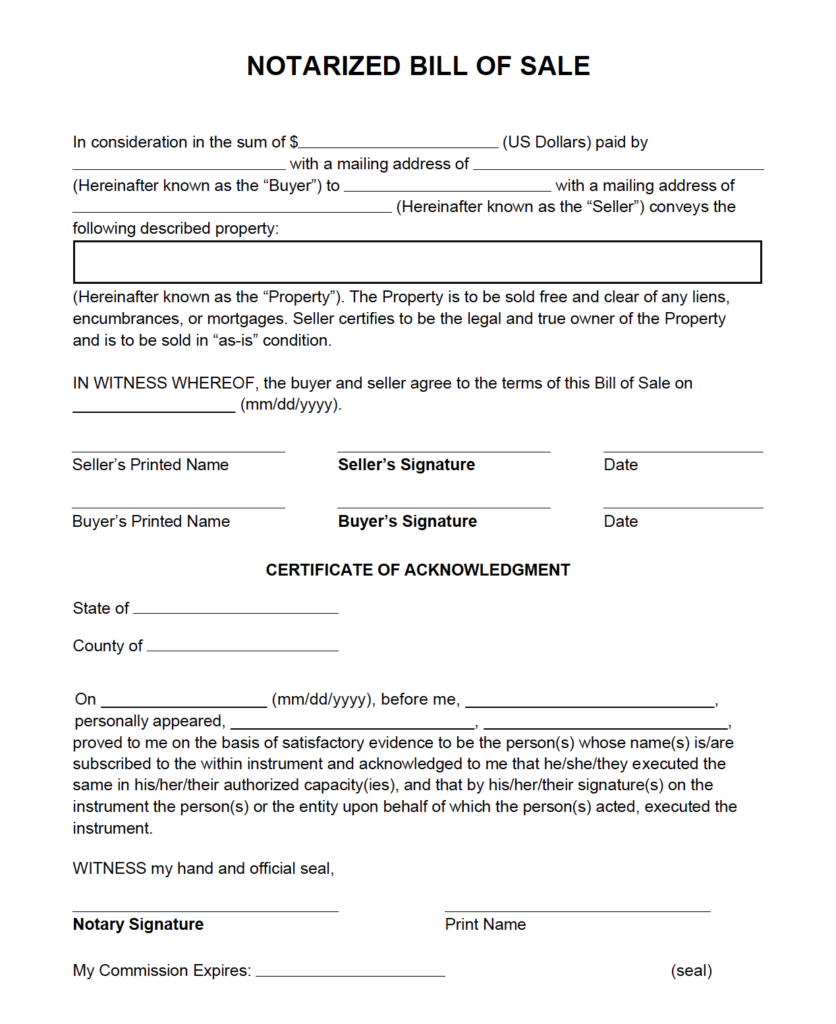The transfer of ownership of an item or piece of property is confirmed by a legally binding document called a notarized bill of sale.
The buyer, seller, and a notary public sign it, verifying the parties’ identities and certifying the legitimacy and legality of the contract.
It can be challenging to determine if you require a notarized bill of sale or buyer’s order in any particular circumstance. Thus, to assist you in making better decisions going forward, I will go into greater detail on the former in this post.
Do bills of sale need to be notarized?
In the majority of US states, notarization of a bill of sale is not always required by law. However, a notary public or other impartial third party may testify in cases involving valuable assets or real estate. To process documents, government organizations occasionally need to see a notary’s seal or certificate of authority.
A Notarized Bill of Sale: What Is It?
The phrase “notarized bill of sale” describes a bill of sale that has undergone notarization from a notary public. As a matter of protocol, an official notary public verifies the information and authenticates the signers’ identities.
Is a bill of sale legally binding, whether it’s notarized or not?
Yes, whether or not a bill of sale is notarized, it is still usually regarded as legally binding.
The absence of notarization does not render the bill of sale void, even if it can be needed in some jurisdictions, and adds authenticity.
The following items make up a legally binding bill of sale:
- Consent. Both the seller and the buyer voluntarily accepted the terms and conditions of the bill of sale and entered into the transaction.
- Considering. The bill of sale documents the exchange or payment made by the buyer for ownership of items.
- The purpose. Both parties expressly declare in the bill of sale that they intend for ownership to pass from seller to buyer.
Despite not being necessary, there are a few reasons to think about having a bill of sale notarized:
Notarizing facilitates and expedites the transfer of ownership.
Having a bill of sale notarized guards against fraud for both buyers and sellers.
A notarized bill of sale can be required for upcoming paperwork.
How to notarize a bill of sale
Here’s how to obtain a notarized bill of sale, step-by-step instructions included.
Get the document ready:
To precisely capture the information of the transaction, either create your paperwork or utilize a notarized bill of sale template.
This should contain the following details: the buyer’s and seller’s details, the item’s description, the price, and any additional terms and conditions.
Locate a notary for a bill of sale:
A certified professional with experience notarizing bills of sale is what you require.
Public offices, law companies, and banks employ notaries.
For distant online notarization services, you can also look through internet directories.
Bring the paperwork and proof of identity:
Both the seller and the buyer must present a legitimate form of identification, such as a passport or driver’s license.
Additionally, bring the bill of sale paperwork.
Sign in the notary’s presence:
Call a meeting of the concerned parties and the notary.
In their presence, sign the bill of sale.
The notary will witness the signature and verify your identity.
Acknowledgment from the Notary:
The notary will finish the notarial certificate, adding their seal, signature, and notarization specifics if needed.
They can attest to the signing with this certificate.
Give the notary money:
Typically, notaries bill for their services.
Make sure you have the money to pay for this.
Recognize the owner of the bill of sale:
Upon notarization, you will receive the bill of sale, so don’t forget to bring it with you.
For their records, both parties should retain a copy.
Does notarizing a bill of sale require the presence of both parties?
Is it possible to notarize a bill of sale without the seller present? Maybe your question.
A notary public may, under certain circumstances, notarize the signature of one party on the bill of sale.
This could occur if they have given permission for someone else to sign on their behalf but are not present.
Whether or not both parties need to be present for a bill of sale notarization depends on the applicable laws and conditions.
Summary:
Although notarizing a bill of sale adds legitimacy and security, it’s important to confirm that it complies with all applicable laws and ordinances. The kind of property and the jurisdiction may have different requirements.
Legal validity requires compliance with state legislation. A bill of sale form is available from LawDistrict, and notaries or attorneys can offer advice.
Notarized Bill of Sale: Sample


